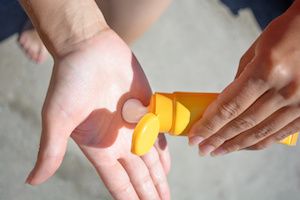Skin Cancer Risk Factors
 Certain factors may put you at higher risk for developing skin cancer. While some are under your control (i.e. lifestyle choices and amount of sun exposure), others are not. However, the more you know about how to prevent skin cancer the easier it can be to reduce your risk – or at least detect skin cancer early when it’s easier to treat.
Certain factors may put you at higher risk for developing skin cancer. While some are under your control (i.e. lifestyle choices and amount of sun exposure), others are not. However, the more you know about how to prevent skin cancer the easier it can be to reduce your risk – or at least detect skin cancer early when it’s easier to treat.
It’s important to remember that risk factors don’t tell us everything. Having a risk factor (or more than one) does not guarantee that you’ll get the disease. Likewise, some people who develop skin cancer may not have had any known risk factors at all.
What Are Skin Cancer Risk Factors?
The primary risk factor for skin cancers – both melanoma and nonmelanoma – is exposure to ultraviolet (UV) light, including sunlight and tanning beds. The more UV light you’re exposed to, the higher your chances are for developing skin cancer, especially if you don’t protect your skin.
This includes:
- Fair-skinned people
- Darker-skinned people of any ethnicity
- People who live in areas with year-round pleasant weather
- People who spend a large part of their days outdoors in any climate
Other risk factors vary for different types of skin cancer, but there are some general risk factors that include:
- Physical traits such as fair skin, blue or green eyes, and blonde or red hair
- A family history of skin cancer
- Personal history of skin cancer
- Skin that reddens, burns, or freckles easily in the sun
- Skin that becomes painful in the sun
- Older in age
- Smoking
- Certain types and/or a large number of moles
- Exposure to chemicals or radiation other than the sun
- A weakened immune system caused chronic illnesses, organ transplants, and certain medications
Skin Cancer Prevention Tips
The best way to prevent skin cancer is to try to minimize the risk factors that are in your control. The number one thing you can do is protect yourself from ultraviolet (UV) radiation all year round, not just during the summer. Even on cloudy or hazy days, UV rays can reach your skin. UV rays also reflect off of surfaces including water, cement, sand and snow.
Being extra cautious between 10 a.m. and 4 p.m. may be helpful since the sun’s rays are most hazardous during that time. In North America, UV rays from sunlight are the strongest during the late spring and early summer.
Some easy options for protection against UV radiation include:
- Seeking shade
- Covering your arms and legs
- Wearing a wide-brimmed hat
- Wearing sunglasses that block both UVA and UVB rays
- Using sunscreen with sun protection factor (SPF) 15 or higher and reapplying it every 2 hours.
- Avoiding indoor tanning
What to Do if You Feel You’re at Risk of Developing Skin Cancer
In addition to the prevention tips above, performing regular skin self-exams, or having a physician perform a professional skin exam annually, can be helpful in the early detection of skin cancer.
If an area on your skin looks suspicious or concerns you, speak with your doctor immediately. If your doctor suspects that you may have skin cancer, he or she will do further examination and testing. The sooner it is looked at, the easier it can be to cure.
Learn more about the types of skin cancer treatments available at Virginia Oncology.


